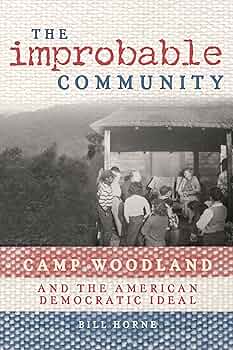Camp Woodland And the American Democratic Ideal

What is the American democratic ideal?
At its core, it is the aspiration of equality, inclusion, and mutual respect. While these principles may appear simple, true examples of communities that have embodied them are rare. Camp Woodland is one of those rare examples. Its founder, Norman Studer, shaped by the social and political upheavals of World War II, sought to create a summer camp that would model cultural inclusion, progressive education, and democratic values. For more than two decades, Camp Woodland stood as a folk-singing institution that carried these ideals through the postwar years, the Cold War and McCarthyism, and into the beginnings of the Civil Rights movement. Bill Horne, a camper deeply influenced by the lessons he learned there, later chronicled the camp’s importance within the broader sweep of American history in his book The Improbable Community.
With personal anecdotes of his time in the Catskills, Horne describes the origins and ideals of Camp Woodland that Norman Studer envisioned when he opened the camp in 1939. Through daily chores, hikes, and group activities, the culture of Camp Woodland fostered inclusion and shared responsibility, nurturing an environment of camaraderie and trust not defined by cultural or racial barriers. A key feature of Studer’s vision was bringing together campers and staff from different racial and ethnic backgrounds. Additionally, the camp held reverence for the land it stood on by preserving local traditions in its educational program. Anti-war ballads such as “Where Have All the Flowers Gone” echoed throughout the grounds, binding campers to larger struggles for peace and justice. While Horne acknowledges that the social turmoil of the 20th century inevitably affected the camp, he emphasizes that conflicts were resolved through collective decision-making and mutual respect. Though the camp eventually ended in 1962, its legacy clearly resonates with each camper to this day, and its vision of democracy remains a hopeful reminder that the American ideal can be achieved.
Bill Horne is an attorney in trade regulation Wasington D.C., and civil rights law in Boston, Massachusetts. Groing up in Queens, New York, he was a camper for a decade at Camp Woodland.
Reviews and Endorsements of this Publication include the following:
“Tells the story of a remarkable summer camp in the Catskill Mountains of New York. From 1939 to 1962, Camp Woodland created an educational experience that fostered a unique community …”
-Joe Hickerson, Archive of Folk Song Culture and former Camp Counselor
“In this excellent telling, author (and former camper) Bill Horne weaves a complex story that describes how John Dewey’s educational philosophy merged with democratic ideals and the political witch hunts of the 1950s to create the world of Camp Woodland set in the natural beauty of the rugged mountains.”
– John Cohen, filmaker, photographer, and musician for New Lost City Ramblers
For more information on this publication, click here:
“For more of “On the Lived Theology Reading List,” click here. To engage in the conversation on Facebook and Twitter, @LivedTheology, please use #LivedTheologyReads. To sign up for the Lived Theology newsletter, click here.”
